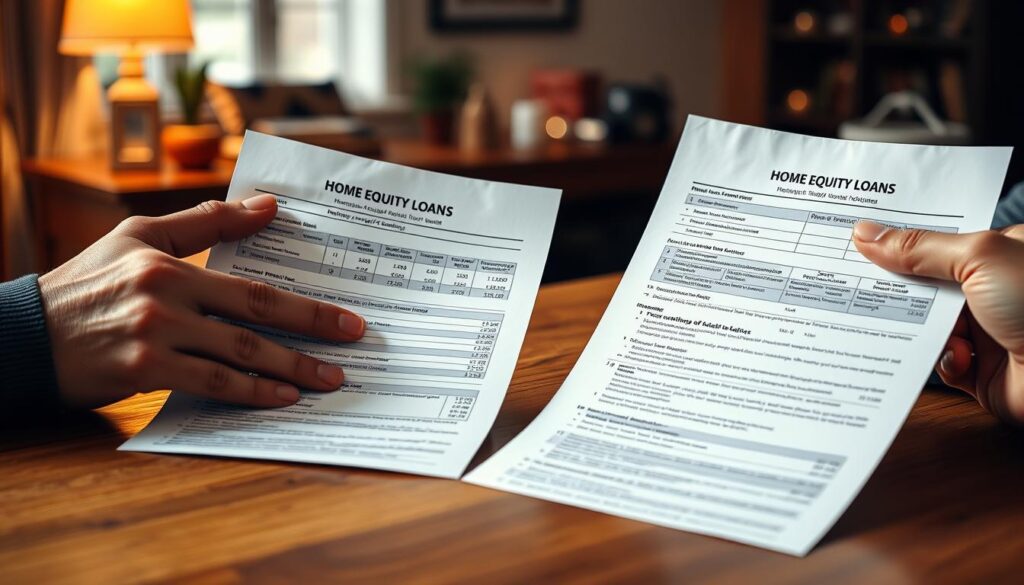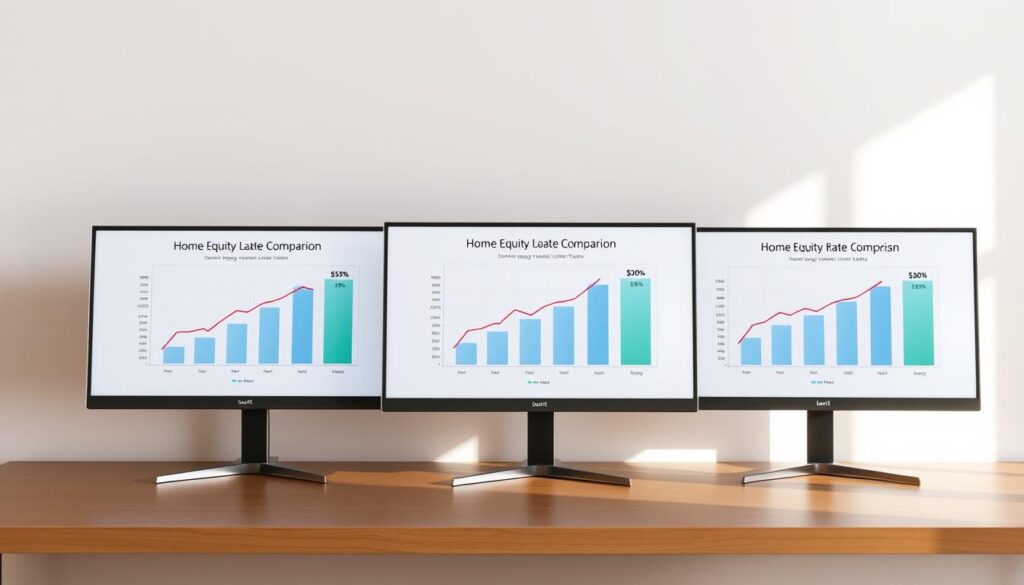Discover the Best Home Equity Loan Rates Today
Did you know thousands of homeowners in the U.S. have a lot of untapped wealth in their homes? With the right loan options, they can unlock this wealth and reach their financial goals.
Knowing about home equity loan rates is key to making smart borrowing choices. The rates can greatly affect the loan’s cost. So, it’s important to find the most favorable rates out there.
We’ll show you how to get the best home equity loan rates. This will help you make the most of your financial situation.
Key Takeaways
- Understanding the importance of home equity loan rates
- Factors influencing home equity loan rates
- Tips for securing the best loan rates
- The impact of loan rates on your financial decisions
- How to navigate the home equity loan market effectively
Understanding Home Equity Loans
To make smart choices about borrowing against your home, you need to know about home equity loans. These loans let homeowners use the equity in their homes to get a loan. This can be helpful for things like home improvements or paying off debts.
What is a Home Equity Loan?
A home equity loan lets homeowners borrow money using their home’s equity as security. Equity is the difference between your home’s value and what you owe on it. Home equity loans give you a single payment for various needs, with a fixed interest rate and a set time to pay it back.
How Does a Home Equity Loan Work?
When you apply for a home equity loan, lenders check your credit, your home’s value, and how much equity you have. Getting approved is not a sure thing, and lenders might have rules or restrictions. For example, some won’t lend in IA or MD. To understand your loan terms, use a home equity rate and payment calculator. It helps you figure out your monthly payments and the loan’s total cost.
Here are some important things to think about when looking at home equity loans:
- The loan amount depends on your home’s equity.
- Interest rates vary, so it’s important to compare them.
- Repayment terms are usually fixed, making payments predictable.
- If you can’t repay the loan, you could lose your home, as it’s used as collateral.
Knowing these basics helps you decide if a home equity loan is a good choice for you.
Factors Influencing Home Equity Loan Rates
To get the best home equity loan rates, knowing what lenders look at is key. Several factors affect these rates. Being aware of them helps borrowers make smart choices.
Credit Score Impact
Your credit score greatly affects the home equity loan rate you’ll get. A higher score means you’re seen as a safer borrower. This can lead to lower interest rates. But, a lower score might mean higher rates or even no loan at all.
Loan-to-Value Ratio Explained
The loan-to-value (LTV) ratio is also very important. It shows how much of your home’s value you’re borrowing. For example, if your home is worth $100,000 and you borrow $60,000, your LTV ratio is 60%. Lenders usually prefer lower LTV ratios because they’re less risky.
Market Trends and Their Influence
Market trends also affect home equity loan rates. Things like inflation and the housing market’s health can change rates. For instance, when interest rates go up, so do home equity loan rates.
Knowing these factors helps you find a good home equity loan. Keep your credit score up, manage your LTV ratio, and stay updated on market trends. This way, you can get the best loan terms.
Current Home Equity Loan Rate Trends
Understanding home equity loan rates is key in today’s market. Home equity loans are popular for tapping into a home’s value. Knowing the current rates helps borrowers get the best deal.
National Averages
The national average for home equity loan rates is a key reference. It’s influenced by the Federal Reserve, economic indicators, and credit demand. For example, a strong economy can lead to higher rates.
Currently, fixed rate home equity loans offer competitive rates. This makes them appealing for those who prefer stable payments.
Regional Variations
While national averages give a general view, regional differences are significant. Economic conditions, housing markets, and regulations vary by area. These factors affect home equity loan rates.
In areas with high housing demand and limited supply, rates may be higher. But, regions with stable or declining markets might offer better rates.
It’s important to know the difference between fixed rate and variable rate home equity loans. Fixed rates stay the same, offering predictable payments. Variable rates can change with the market, starting lower but possibly increasing.
“When interest rates are low, a fixed rate loan can provide long-term savings and stability. But, if rates are high, a variable rate loan might offer a lower initial rate. Yet, borrowers should be ready for potential rate increases.”
Let’s look at how APR affects monthly payments. A $50,000 home equity loan with a 10-year term at 6% APR has a monthly payment of about $555. If the rate starts at 5% but goes to 7%, payments could rise significantly.
In summary, knowing the current home equity loan rate trends is crucial. Understanding national averages and regional differences helps in making informed decisions. By considering both fixed and variable rate loans, homeowners can choose wisely based on their financial goals and risk tolerance.
How to Compare Home Equity Loan Rates
To get the best deal on a home equity loan, it’s key to know how to compare rates well. It’s not just about finding the lowest rate. You also need to understand the total cost of the loan.
Interest Rates vs. APR
When comparing home equity loan rates, it’s important to know the difference between interest rate and APR. The interest rate is the cost of borrowing the loan amount. The APR includes the interest rate and other fees like origination fees and points.
Let’s look at an example:
| Loan | Interest Rate | APR |
|---|---|---|
| Loan A | 4.5% | 4.7% |
| Loan B | 4.3% | 4.9% |
Loan B has a lower interest rate but a higher APR. This means Loan B might have more fees. So, Loan A could be more cost-effective over time.
Fixed vs. Variable Rates
Another important factor is whether the rate is fixed or variable. A fixed rate stays the same, giving you predictable payments. A variable rate can change with market conditions, affecting your payments.

Choosing between fixed and variable rates depends on your financial situation and market trends. If rates are low and expected to rise, a fixed-rate might be better. If rates are high and falling, a variable-rate could save you money.
The Application Process for Home Equity Loans
To apply for a home equity loan, knowing what documents you need is key. We’ll walk you through the steps and what’s required.
Documents Needed
Lenders need certain documents to review your application. These include credit reports, property information, and financial statements. Having these ready can make the process smoother.
- Credit reports to check your creditworthiness
- Property information, like the property’s value and mortgage balance
- Financial statements, including income and bank statements
Timeline for Approval
The approval time varies by lender and application complexity. Usually, it takes 2 to 4 weeks from when you apply. Being prepared can speed things up.
Knowing the application process and having your documents ready can make getting a home equity loan easier. It’s wise to compare rates with different lenders to find the best home equity loan rates.
Tips for Securing the Best Rates
To get low home equity loan rates, being informed and prepared is key. This can save you thousands over the loan’s term. Homeowners should focus on two main strategies.
Improve Your Credit Score
Your credit score is crucial for the interest rate you’ll get. Lenders see high scores as less risky, offering better loan terms. To boost your score, pay bills on time, lower your debt, and avoid new credit checks.
Keeping a good credit history helps you get better loan rates. It also opens doors to more financial products. A score of 750 or higher is considered good and can get you the best rates.
Shop Around for Lenders
Don’t accept the first lender’s offer. Shopping around for lenders can lead to better rates. Look at offers from banks, credit unions, and online lenders to find the best deal. Even a small rate difference can save a lot over time.

When comparing lenders, look at more than just rates. Check the fees, repayment terms, and customer service quality. By doing your research, you can find a current home equity loan rate that suits your needs and goals.
Common Uses for Home Equity Loans
Home equity loans are great for handling big expenses. Homeowners use them to fund big projects or to pay off debt.
Home Renovations
Financing home renovations is a top reason for using home equity loans. You can get money for updating your kitchen, adding a room, or making your home more energy-efficient. With competitive home equity loan rates, you can afford your renovation without breaking the bank.
Renovations make your home better and can raise its value. Investing in quality upgrades can increase your home’s resale value. It’s a smart move financially.
Debt Consolidation
Home equity loans are also used for debt consolidation. They help combine high-interest debts into one, lower-interest loan. This simplifies your finances and can save you money on interest.
When looking at debt consolidation through a home equity loan, check the affordable home equity loan rates. This ensures you get a good deal that fits your financial plans.
Risks of Home Equity Loans
Home equity loans can be helpful, but they also have big risks. It’s important to know these risks before deciding.
One big risk is foreclosure. If you can’t pay back the loan, you could lose your home. This is because the loan is secured by your home.
Potential for Foreclosure
Foreclosure is a big worry for homeowners who use their home as loan collateral. To avoid this, you need a solid financial plan and a way to pay back the loan. It’s key to check your financial health before getting a home equity loan.
For more info on avoiding home equity loan risks, check out Bankrate’s guide on home equity loans.
Impact on Your Financial Health
Home equity loans can also hurt your finances. For example, using one to pay off debt might seem good at first. But, it can lead to paying more interest in the long run if not managed well.
| Risk Factor | Description | Mitigation Strategy |
|---|---|---|
| Foreclosure | Risk of losing your home due to loan default | Assess financial stability, create a repayment plan |
| Financial Health Impact | Potential for increased debt and interest payments | Use loans for necessary expenses, avoid unnecessary debt |
| Interest Rate Risk | Variable rates can increase over time | Consider fixed rate home equity loans for stability |
To lessen risks, compare home equity loan rates from different lenders. Also, talking to a financial advisor can help. Being informed and careful can help you use a home equity loan wisely and protect your finances.
Frequently Asked Questions
We’ll answer some common questions about home equity loans. This will help you understand the process and benefits of using this financial tool.
How Much Can We Borrow?
The amount you can borrow depends on several things. These include your credit score, the loan-to-value ratio, and your lender’s policies.
Lenders usually let you borrow up to 80% or 85% of your home’s equity. For example, if your home is worth $200,000 and you owe $100,000, you might borrow $60,000 to $80,000. This depends on your lender’s terms and your financial situation.
Can We Refinance a Home Equity Loan?
Yes, you can refinance a home equity loan. Refinancing means getting a new loan to replace your old one. You might get a lower interest rate, change the loan term, or switch from a variable rate home equity loan to a fixed-rate loan, or vice versa.
Refinancing is a good idea if interest rates have dropped or if your credit score has improved. This could qualify you for best home equity loan rates.
| Loan Amount | Interest Rate | Loan Term |
|---|---|---|
| $60,000 | 4.5% | 10 years |
| $80,000 | 4.2% | 15 years |
| $100,000 | 4.0% | 20 years |
Conclusion
Understanding home equity loan rates is key to smart financial planning. Knowing how credit score and loan-to-value ratio affect these rates helps you make better choices. This knowledge is vital when you’re looking to get a home equity loan.
To find the best rates, compare offers from different lenders. This way, you can spot the most competitive deals. Then, pick the one that fits your financial goals the best.
Smart Financial Decisions
Being informed and proactive can help you use your home’s value wisely. Whether you need funds for renovations or to pay off debt, a good home equity loan can help. Use what you’ve learned to make smart choices and get the best rate for your needs.









